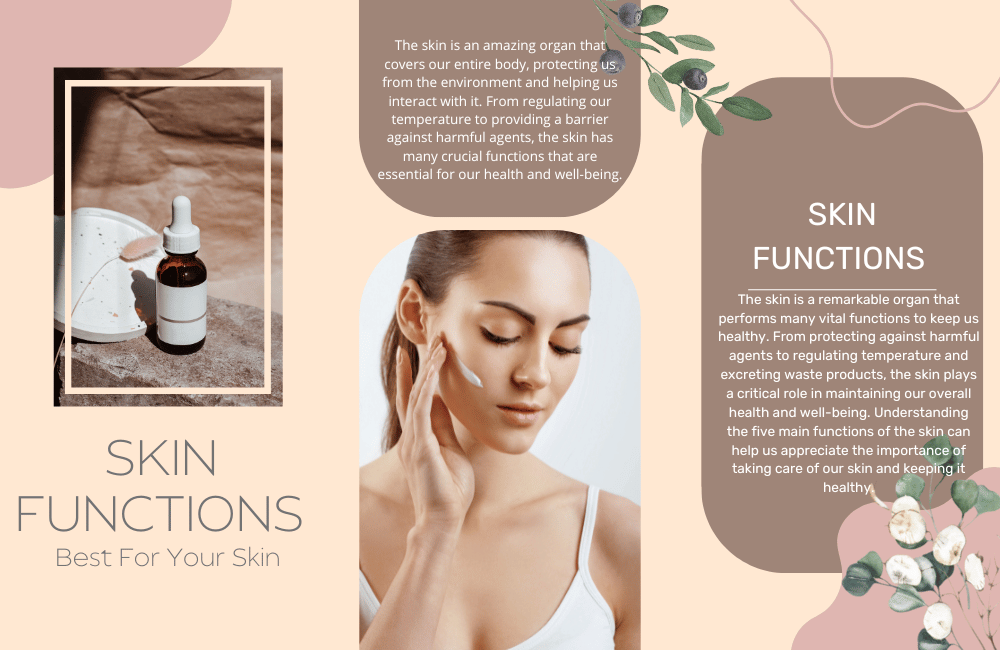The skin is an amazing organ covering our entire body, protecting us from the environment and helping us interact. From regulating our temperature to providing a barrier against harmful agents, the skin has many crucial functions for our health and well-being. In this article, we’ll explore the five main functions of the skin and how they help keep us healthy.

Main Functions of the Skin
Let’s roll up our sleeves and delve into the incredible world of the skin to learn about its main functions. As the body’s largest organ, the skin serves many purposes beyond providing a physical barrier. From protecting us from external threats like UV radiation and microorganisms to regulating body temperature and providing sensory feedback to the brain, the skin is a complex and fascinating organ. The skin can perform all these functions with remarkable efficiency through its unique structure and composition. Understanding the role of the skin in maintaining overall health and well-being is crucial, and by exploring its functions in greater detail, we can gain a deeper appreciation for the incredible biological machine that is the human body.
Protection
One of the skin’s primary functions is protecting our body from the outside world. It is a barrier, shielding our internal organs and tissues from harmful agents like bacteria, viruses, and toxins. The skin’s outer layer, the epidermis, contains specialized cells that help prevent infections and regulate water loss. Additionally, the skin’s oil glands produce sebum, which helps keep the skin moist and supple and prevents it from drying out and cracking.
Sensation
The skin is also responsible for detecting and processing sensory information like temperature, pressure, and pain. The nerve endings in the skin allow us to feel different sensations, and the brain interprets these signals to create our sense of touch. For example, when we touch something hot, our skin’s nerve endings send a signal to our brain, telling us to pull away to avoid getting burned.
Thermoregulation
The skin helps regulate our body temperature by controlling heat loss and retention. When we’re too hot, the blood vessels in our skin dilate, allowing more blood to flow to the surface and release heat. When we’re too cold, the blood vessels constrict, reducing blood flow to the skin’s surface and conserving heat. The skin also produces sweat, which evaporates and cools us down when overheating.
Vitamin D Synthesis
The skin plays a crucial role in producing vitamin D, a vital nutrient that helps regulate calcium absorption and bone growth. When exposed to sunlight, the skin produces a type of cholesterol that is converted into vitamin D in the liver and kidneys. Without sufficient vitamin D, our bodies can’t absorb calcium properly, leading to weak bones and other health problems.
Excretion
The skin also contributes to excreting waste products from our body, such as urea and lactic acid. Sweat glands in the skin produce sweat, which contains these waste products and helps remove them from our bodies. This excretion process helps maintain a healthy balance of fluids and electrolytes.
If you are a skin enthusiast, you should know What is the Korean 10-Step Skin-Care?
Wrapping Up
The skin is a remarkable organ that performs many vital functions to keep us healthy. From protecting against harmful agents to regulating temperature and excreting waste products, the skin plays a critical role in maintaining our overall health and well-being. Understanding the five main functions of the skin can help us appreciate the importance of caring for our skin and keeping it healthy.
Protecting our skin from harmful agents, such as UV radiation and pollutants, can prevent damage and reduce the risk of skin cancer and other health problems. By staying hydrated, eating a healthy diet, and using appropriate skincare products, we can maintain the skin’s natural barrier and keep it moisturized and healthy.
In conclusion, the skin is a complex organ with many essential functions. By taking care of our skin and understanding its role in our health, we can enjoy the benefits of radiant skin and a healthier, happier life. So, next time you ask yourself, “What are the 5 main functions of the skin?” remember that it’s not just about looking good but also about feeling good and staying healthy.

